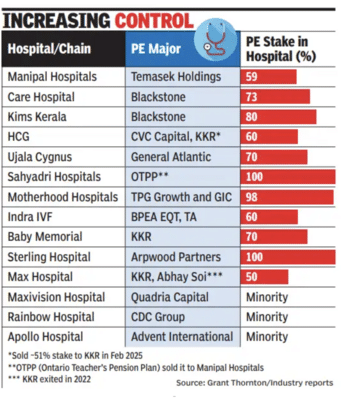India’s private hospital industry has undergone a major ownership shift over the last five years, moving steadily into the hands of global private equity firms, according to a report by Times of India's Rupali Mukherjee.
The trend has reshaped the country’s over $80 billion healthcare market, which was once dominated by government institutions and family-run setups.
The report noted that while sporadic private equity deals in hospitals date back to Apax Partners’ investment in Apollo Hospitals in 2007, the Covid-19 pandemic marked a turning point. The sector has since attracted sustained interest from funds such as Singapore’s Temasek, and US-based TPG and KKR, leading to large acquisitions including Manipal and Max Healthcare.
Abhay Soi, chairman and managing director of Max Healthcare, told TOI that private equity investments in healthcare typically follow a three-five year horizon, after which ownership often reverts to corporates or individuals.
"While private equity brings funds helping drive consolidation and provide last-mile financing, their investment horizons are usually too short to fully support long term asset-creation cycles that healthcare infrastructure demands,” Soi added.
A snapshot of recent deals shows the scale of private equity control: Blackstone owns 80% in KIMS Kerala and 73% in Care Hospitals, Temasek holds 59% in Manipal Hospitals, while Arpwood Partners and OTPP have taken full ownership of Sterling and Sahyadri Hospitals respectively.
Other global players such as CVC Capital, General Atlantic, TPG Growth, BPEA EQT, and Advent International have also built significant stakes across India’s leading chains, according to Grant Thornton and industry data, as accessed by TOI.

The industry shift in India mirrors the US, where most hospitals are privately or institutionally owned. By contrast, the UK runs hospitals publicly through the National Health Service.
Sujay Shetty, global health industries advisory leader at PwC India, said, “Over the last five to six years, private equity ownership in hospitals has steadily increased.” He added that the trend benefits an underserved market that struggles with healthcare access, while also enabling capital infusion, global best practices, and greater professionalisation.
Analysts remain positive about growth prospects, pointing to rising life expectancy, incomes, lifestyle-driven non-communicable diseases, and health awareness. India still faces a shortage of hospital and critical-care beds, increasing the need for new investment.
“Private equity participation brings growth capital, governance and operational expertise, enabling hospitals to improve service quality and expand their footprint. Healthcare has over 20 private equity operators active in India, which is the highest compared to any other sector,” said Bhanu Prakash Kalmath SJ, healthcare industry leader at Grant Thornton Bharat.
Sunil Thakur, partner at Quadria Capital, highlighted the improved profitability of hospital chains. He said, “The ROIs of corporate hospital chains have improved over the last decade or so, primarily because of increasing utilisation, ARPOB and other cost efficiencies.”
(With inputs from TOI)
The trend has reshaped the country’s over $80 billion healthcare market, which was once dominated by government institutions and family-run setups.
The report noted that while sporadic private equity deals in hospitals date back to Apax Partners’ investment in Apollo Hospitals in 2007, the Covid-19 pandemic marked a turning point. The sector has since attracted sustained interest from funds such as Singapore’s Temasek, and US-based TPG and KKR, leading to large acquisitions including Manipal and Max Healthcare.
Abhay Soi, chairman and managing director of Max Healthcare, told TOI that private equity investments in healthcare typically follow a three-five year horizon, after which ownership often reverts to corporates or individuals.
"While private equity brings funds helping drive consolidation and provide last-mile financing, their investment horizons are usually too short to fully support long term asset-creation cycles that healthcare infrastructure demands,” Soi added.
A snapshot of recent deals shows the scale of private equity control: Blackstone owns 80% in KIMS Kerala and 73% in Care Hospitals, Temasek holds 59% in Manipal Hospitals, while Arpwood Partners and OTPP have taken full ownership of Sterling and Sahyadri Hospitals respectively.
Other global players such as CVC Capital, General Atlantic, TPG Growth, BPEA EQT, and Advent International have also built significant stakes across India’s leading chains, according to Grant Thornton and industry data, as accessed by TOI.
The industry shift in India mirrors the US, where most hospitals are privately or institutionally owned. By contrast, the UK runs hospitals publicly through the National Health Service.
Sujay Shetty, global health industries advisory leader at PwC India, said, “Over the last five to six years, private equity ownership in hospitals has steadily increased.” He added that the trend benefits an underserved market that struggles with healthcare access, while also enabling capital infusion, global best practices, and greater professionalisation.
Analysts remain positive about growth prospects, pointing to rising life expectancy, incomes, lifestyle-driven non-communicable diseases, and health awareness. India still faces a shortage of hospital and critical-care beds, increasing the need for new investment.
“Private equity participation brings growth capital, governance and operational expertise, enabling hospitals to improve service quality and expand their footprint. Healthcare has over 20 private equity operators active in India, which is the highest compared to any other sector,” said Bhanu Prakash Kalmath SJ, healthcare industry leader at Grant Thornton Bharat.
Sunil Thakur, partner at Quadria Capital, highlighted the improved profitability of hospital chains. He said, “The ROIs of corporate hospital chains have improved over the last decade or so, primarily because of increasing utilisation, ARPOB and other cost efficiencies.”
(With inputs from TOI)
You may also like

Indian-origin truck driver arrested in Canada, killed a mother-daughter in crash nine months ago, fled Ontario

Mikel Arteta's admission on Eberechi Eze transfer speaks volumes after Tottenham snub

Priyanka Chahar Choudhary's 29th birthday celebration stretched from Mumbai to Goa

Ryan Thomas' daughter Scarlett, 16, teases she didn't take GCSEs as she shares message

'Superb' Christopher Nolan thriller that needs 'multiple watches' is now streaming for free






